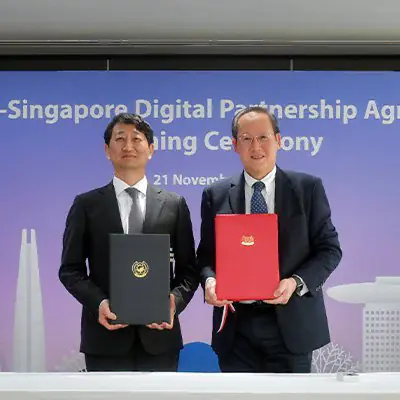As Singapore prepares to transform itself into a global e-commerce hub in the face of strong global competition, an array of initiatives and grants have been rolled out by various government agencies in support of e-commerce investment and developments in Singapore.
Retail Industry Transformation Map (ITM)
Contributing 1.4 per cent to Singapore’s Gross Domestic Product (GDP) with S$33 billion (US$24 billion) in operating receipts and employing 170,000 employees nationwide, retail is a key sector in Singapore’s economy.
Factors that affect the sector include new digital technologies, a growing e-commerce market and overseas market opportunities. The rapidly growing internet retailing market is likely to become a key sales channel for the sector. Therefore, as the environment becomes increasingly competitive, retailers need to adapt to the evolving landscape by innovating and upskilling their employees.
This will enable them to face new challenges and leverage the growth opportunities, both locally and overseas.
The 2020 vision of the Retail ITM is for Singapore to have a vibrant retail industry. This comprises a mix of highly productive omni-channel retailers and local brand owners with global footprints, all supported by a professional and skilled workforce.
With the Retail ITM, retailers can look to strengthen their enterprise capabilities to increase their productivity, and make their presence felt in the global arena with a more vibrant sector supported by a skilled workforce.
Under the Economic Development Board’s (EDB) Industry 21 blueprint, the Info-communications Media Development Authority (IMDA) has teamed up with EDB and the industry to define and adopt common IT standards to enhance seamless B2B documents exchange among companies for the electronic cluster. The plan to accelerate the use of e-commerce comprises of five main thrusts, namely to develop an internationally linked e-commerce infrastructure, jump-start Singapore as an e-commerce hub, encourage its strategic usage by businesses, promote its usage by the public, and to harmonise cross border e-commerce laws and policies.
Start-ups community
For start-ups looking to enter the e-commerce landscape, the Action Community for Entrepreneurship (ACE) is a support platform designed to provide a holistic package to further nurture a vibrant & connected start-up ecosystem.
This collaboration between Enterprise Singapore (formerly known as International Enterprise Singapore and Spring Singapore respectively) and JTC Corporation (JTC) provides co-innovation programmes between corporates and start-ups, and favourable tax regimes.
E-commerce start-ups are also able to tap on the various support schemes provided by ACE ranging from corporate innovation to peer group mentoring as well as access to international markets and communities championing the global startup scene.
Under Enterprise Singapore, the government has leverage shared platforms to enable small and medium-sized enterprises (SMEs) to pool their resources for more efficient operations – with one of it being a shared e-commerce platform.
This e-commerce platform will benefit SMEs looking to enter e-commerce but are unable to afford the initial capital costs. The platform, designed to get them into the online marketplace, will offer support such as integrated warehouse functions, inventory management solutions and order-fulfilment capabilities, allowing the streamlining of the logistics chain, increasing efficiency by up to 45 per cent.
ezyCommerce, a partnership between Enterprise Singapore and Singapore Post (SingPost), offers SMEs a subsidised rate for use of its one-stop fulfilment service. Under the Collaborative Industry Projects (CIP) initiative, SMEs including those that deal with e-commerce, will be eligible for up to 70 per cent funding support for qualifying development and/or adoption costs.
Software-and equipment-related project cost will be supported at up to 50 per cent. This helps automate many of the fulfilment processes, eliminating a majority of the manual labour that is traditionally needed for an order fulfilment, essentially taking care of deliveries from the warehouse to the last mile delivery.
With a majority of venture funds raised by Internet companies being invested in Singapore and recent years’ spikes in e-commerce retailing, JTC’s LaunchPad@ one-north acts as a platform to further capitalise on this trend. It offers a conducive environment and nurturing ecosystem for e-commerce start-ups, with close proximity to multi-disciplinary R&D environment which includes knowledge-based companies, institutes of higher learning and research institutes that are at the forefront of innovation.
Networked Trade Platform (NTP)
The Inland Revenue Authority of Singapore (IRAS) has also rolled out its plans to support e-commerce investments in Singapore. The Networked Trade Platform (NTP) is an advanced trade information management platform to support companies in the trade and logistics industry and adjacent sectors such as trade finance, where importers and exporters would have access to all government-related and commercial trade services. This mainly involves the electronic bill of lading and sea freight e-commerce. The NTP will help businesses boost productivity by streamlining work processes, reducing inefficiencies of manual trade document exchange, and leveraging data analytics for insights from their trade data, so as to be well-equipped for the digital economy. It also enhances the competitiveness of local SMEs in the field of e-commerce with regards to international trade and promotes Singapore as a strategic destination of choice for traders, shippers, logistics and trade finance companies around the globe.
Ancillary to this, electronic services provider CrimsonLogic has launched its Global eTrade Services (GeTS) to help businesses meet regulatory and compliance requirements across borders more quickly and efficiently, facilitating the electronic exchange of trade documents between traders and foreign government agencies, enabling businesses to clear customs with greater speed and ease.
Talent development
Support for e-commerce in Singapore can also come in the form of skills upgrading for individuals working in this field and other related sectors, enabling them to adapt their skills to become more competent, increasing productivity overall. Mainly under the large umbrella of SkillsFuture, this collaboration between Workforce Singapore (WSG) and SkillsFuture Singapore (SSG) (formerly Workforce Development Agency) offers a wide range of skills for available for individuals to tap on and increase their competency.
Skills framework for retail
The Skills Framework is a SkillsFuture initiative developed for the Singapore workforce to promote skills mastery and lifelong learning, and is an integral component of the Retail Industry Manpower Plan.
Jointly developed by SkillsFuture Singapore (SSG), WSG, and the Enterprise Singapore, together with industry associations, training providers, organisations and unions, the Skills Framework for Retail provides useful information on:
- Sector information
- Career pathways
- Occupations and job roles
- Existing and emerging skills
- Training programmes for skills upgrading and mastery
A special focus training on e-Commerce and Omni-channel is also a part of the Skills Framework for Retail.
This article was adapted from “Singapore: E-Commerce. Gateway to ASEAN and Southwest Pacific”, a supplement published by Supply Chain Asia.
To read more about the opportunities and challenges for ASEAN’s e-commerce industry, click here.
To read more about Singapore’s last mile delivery developments and case studies, click here.







